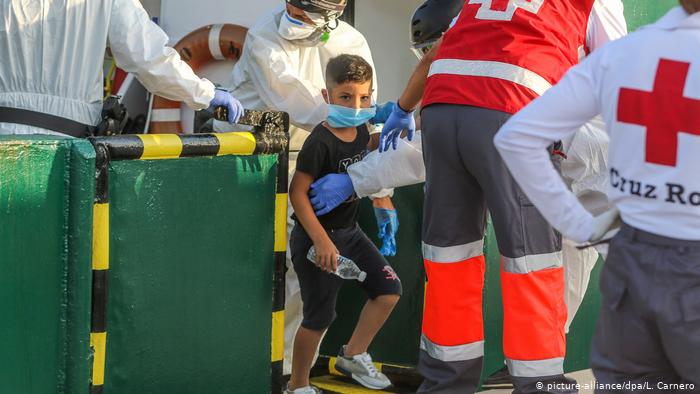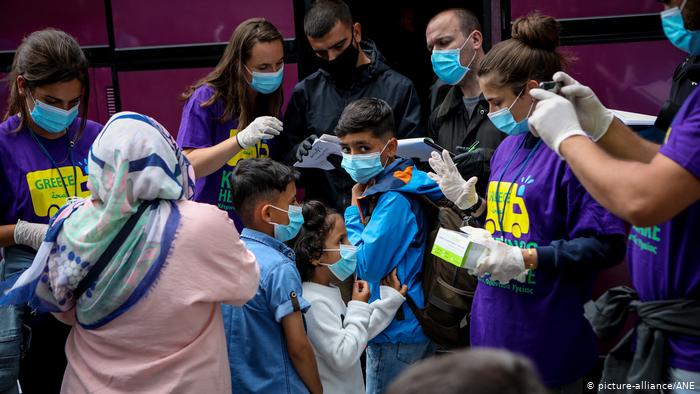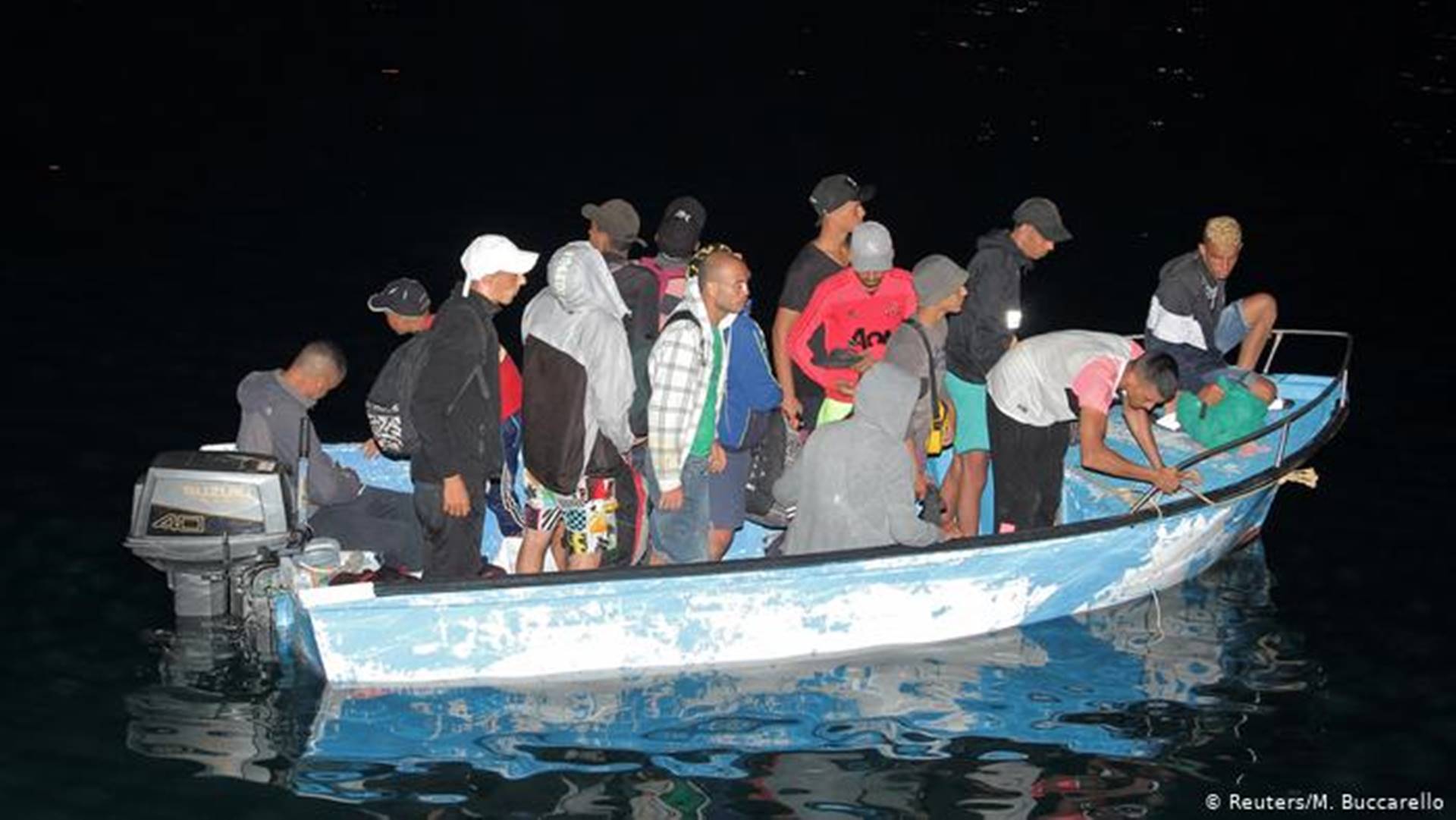Mayors are sounding the alarm in southern Italy: reception centers for refugees are overcrowded, and there is growing resentment in the population. Other Mediterranean states also report rising numbers of refugees.
There is a lot of anger among local mayors aimed at the Italian government at the moment. They are reporting unbearable heat and cramped conditions in refugee camps that are too small and overcrowded — and are demanding a ban on new admissions in their municipalities.
More than 13,000 migrants have come to Italy this year via the Mediterranean Sea, which is about 9,000 more than in the same period last year. According to the UN Refugee Agency, many people embarked on the perilous journey in July, when the waters were relatively calm.
The local mood is tipping
Felix Weiss of the Sea Watch refugee rescue organization recently returned to Germany from a several-week aerial reconnaissance mission on Lampedusa. He has reported that the mood on the island is threatening to deteriorate: “The situation on Lampedusa is extremely tense. In the past months, almost 5,500 people have reached the island on their own. That is two or three boats a day.”
The German volunteers have not yet registered any attacks, but recently two smaller shipyards, where the migrants’ wooden boats are often stored, were set on fire — and Weiss also senses a changed mood among the population, which used to be open-minded towards the migrants.
Controversy about responsibility
According to the sea rescuers, the coronavirus outbreak has increased economic pressure on the local population. Tourism, the main driver of the island’s economy, has collapsed. There are fewer than half of the visitors than in normal years are currently on the island, Weiss estimated. If, as happened recently, wooden boats with migrants land on the tourist beaches, the situation would become even more difficult.
Under these circumstances, offers of support from Rome meet with little response. The government wants to send a quarantine ship to the port of the Sicilian municipality of Porto Empedocle. The Interior Ministry thinks asylum-seekers could go into quarantine there. But the mayor of the small port town has refused, fearing a risk to the vital tourism sector.
Recently there have been many problems with coronavirus prevention in the refugee accommodations. Hundreds of migrants have secretly chosen to leave the camps in violation the quarantine regulations. Even so, a major coronavirus outbreak has not occurred.
Meanwhile, the head of the right-wing populist party Lega, Matteo Salvini, is trying to make political capital out of the situation. During a visit to Lampedusa a week ago, the former interior minister, who while in office endeavored to keep migrants from Italy’s shores, blamed the increasing number of newly arriving migrants for the poor situation of tourism and fishermen on the island.
Salvini, who was celebrated by numerous supporters on Lampedusa, in speeches and on Twitter repeatedly called for a stop to the “invasion” and questioned the need to help migrants at all. At present, the new arrivals on Lampedusa are mainly from Tunisia, which has been badly hit economically by the pandemic.

Brussels should help
The Italian government has also responded to the call for help from the municipalities by mobilizing the army, which has dispatched around 300 soldiers to Sicily to guard reception camps and quarantine stations. Rome has also asked the European Union for support, which means, above all, that EU partners should share the burden of housing and caring for migrants and asylum-seekers.
On Friday evening, Italian Interior Minister Luciana Lamorgese and her French counterpart, Christophe Castaner, agreed on a new political initiative. The two ministers want to breathe new life into the so-called Malta Agreement on the distribution of migrants from the EU’s southern border to other states. In the agreement, a group of EU states — including Germany — had agreed on an orderly distribution of migrants in 2019. But the implementation is not working.
It is not only Italy that is registering more people seeking protection. Authorities in Spain have also reported an increase in Mediterranean crossings. With around 2,000 people, significantly more migrants arrived on the Spanish coasts in July than in previous months. In Murcia and Almeria, 700 people landed in boats last weekend, mostly carrying people from Algeria, not from Morocco as usual.
But unlike in Italy, the situation has not worsened compared to the previous year, with the exception of the Canary Islands. Nevertheless, the government does not have the situation fully under control. Observers complain about a confusion of jurisdictions due to the quarantine obligation. The Spanish government does not want to place new refugees in the reception camps because it fears they could introduce the virus there. But the regional governments would have to provide the necessary quarantine accommodations. This is currently being done in tents, which is also problematic given the intense heat in the country.
The situation in Greece, on the other hand, is relatively calm. The refugee agency there registered only 244 migrants at the border in July, the UN organization said in response to a DW inquiry, compared with 5,008 people in the same month last year. The far greater problem in Greece is the still overcrowded camps on the islands.

Italy wants reform of refugee policy
While the states dealing with these new challenges are still sorting themselves out at the European level, the Italian government wants to set an example and facilitate the work of NGOs in rescuing refugees. Italian media reported on Friday, representatives of the Left Democratic Party and the Five-Star Movement agreed to change the regulations enforced by former Interior Minister Salvini.
One point of the compromise would be to drop the millions of euros in fines imposed on ships of aid organizations. In addition, the government wants to reintroduce extended humanitarian protection for migrants and refugees and expand the admission procedure.
Weiss of Sea-Watch, however, is still skeptical as the practical situation has not changed.
“At the moment, the emergency rescue services are not working with us at all,” he said. “We receive calls in which the officers tell us that they no longer work with NGOs or do not talk to us at all. We have also seen in the past few days how coast guard boats simply pass by wooden refugee boats and only take in the refugees when they enter the waters off Lampedusa.”
Meanwhile, the sea rescue vessel Sea Watch 3, which has been seized by the Italian authorities, has spent the last three weeks moored off Porto Empedocle in Sicily.
DW / Balkantimes.press
Napomena o autorskim pravima: Dozvoljeno preuzimanje sadržaja isključivo uz navođenje linka prema stranici našeg portala sa koje je sadržaj preuzet. Stavovi izraženi u ovom tekstu autorovi su i ne odražavaju nužno uredničku politiku The Balkantimes Press.
Copyright Notice: It is allowed to download the content only by providing a link to the page of our portal from which the content was downloaded. The views expressed in this text are those of the authors and do not necessarily reflect the editorial policies of The Balkantimes Press.

